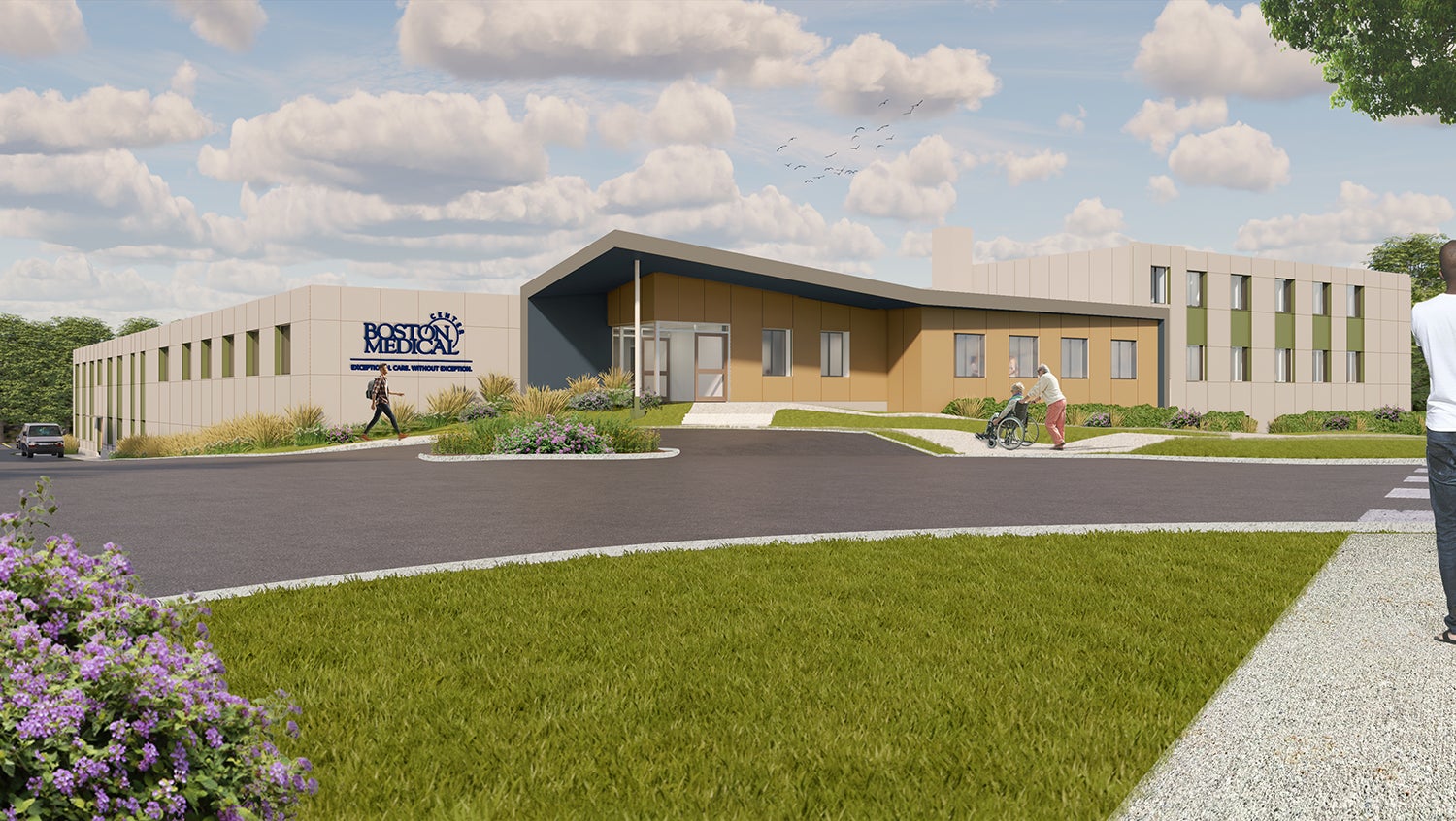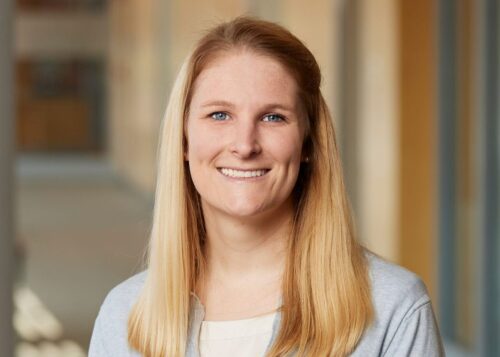New Brockton Facility Aims to Address Two Big Issues: Behavioral Health and Climate Justice
September 13, 2022

ISGenuity
Brockton Behavioral Health Center has been intentionally designed to offer addiction recovery and mental health care to the most vulnerable.
The ongoing COVID-19 pandemic has been associated with a rise in people reporting new and increased mental health challenges, including suicidal ideation, as well as a significant increase in substance use and overdose deaths. Mental health struggles and substance use disorder (SUD) are far from strictly a COVID-related public health problem, but the pandemic has created a pivotal moment for healthcare systems to either be proactive in addressing the desperate need for treatment and support or risk letting the most vulnerable in the community suffer and fall through the gaps.
For Boston Medical Center (BMC), that proactive role means increasing the supply of critical behavioral health and transitional services with a new center — crucially, from a lens of health equity, ensuring that the most vulnerable have high-quality access.
Leading the charge in creating new opportunities for people living with SUD and other mental health concerns isn’t just the right thing to do on a human level, but it’s an effective strategy for hospitals and health systems.
Internal data at BMC shows that 48% of its MassHealth members have behavioral health needs compared to the average Medicaid population (35%), and this subset drives 83% of the total cost of care (TCOC). The bulk of this cost of care is driven by dual-diagnosis behavioral health patients, specifically those who have a severe mental health disorder or have SUD, predominantly opioid use disorder.
However, there is a major dearth of facilities in Massachusetts for people seeking inpatient behavioral healthcare, particularly those with co-occurring SUDs. All anyone has to do is look at the issue of emergency department boarding in hospitals to see that capacity for care centers is strained. At BMC, for example, psychiatry-related ED boarding has increased by 53% amid the COVID-19 pandemic related to bed closures and a shortage of qualified behavioral health providers.
Moreover, only 50% of ED referrals of these MassHeath patients to SUD stabilization services are successfully placed, intensive transitional services are reducing capacity (there is only one clinical stabilization service in Boston as of 2021), and even with placement, the high rates of readmission point to quality-of-care concerns.
The bottom line? For many across the U.S., and specifically for BMC’s vulnerable patients, demand far outstrips supply for critical behavioral health inpatient and transitional services.
“We believe that what from we’ve seen, it’s made the extremely compelling case that we need to take a more proactive role. There’s a great opportunity there for us from both an access issue and a quality issue for our members,” says Ryan Boxill, PhD, MBA, the Chief Behavioral Health Officer for the BMC Health System, speaking about how BMC can address is MassHealth patients’ behavioral heath needs.
Underlining to BMCHS’s decision to take that proactive role, Boxill pointed to internal data reporting show that when patients access treatment, there is an approximate 25% reduction in total cost of care.
“The good news that we saw is that treatment works. And I’ll say it again, treatment does actually work,” Boxill says.
Launching the Brockton Behavioral Health Center
Last year, BMC Health System purchased a former nursing home in Brockton, Massachusetts. Now, that hospital-zoned facility is re-launching as the Brockton Behavioral Health Center, a state-of-the-art center specifically designed to meet MassHealth patients’ needs around behavioral health. Boxill notes that the new center will predominantly serve MassHealth members, as opposed to a common traditional model of similar centers requiring a minimum number of members on Medicaid.
“Given the [COVID-19] pandemic and the emergency room boarding crisis that Massachusetts has been experiencing due to the pandemic — now more than ever — it’s important that people have community-based access to treatment without the worry of how they will access or pay for care,” says Tracey Weeden, the new executive director of the Brockton Behavioral Health Center.
The new Brockton center will comprise two 28 bed inpatient psychiatric units for people aged 16 and older and a 26-bed clinical stabilization service (CSS) for adults. The CSS unit operates 24 hours a day, seven days a week for people seeking longer-term recovery from SUD. The team will aim to coordinate with a patient’s external health providers in an effort to close the gaps where people in treatment can historically get lost in the recovery process. The focus will be on a harm-reduction approach to recovery, including medication treatment for eligible patients.
“Harm reduction is human beings serving human beings,” Weeden explains. “It means seeing and accepting people as they are without judgment, and then working with the individual to get to the next step, whatever that next step looks like for them. It means we are the tool. The patient is their own expert. They know what their goals are, and we as providers are a tool to help them get there.”
Approaching care with multicultural competence and humility
It’s not just its Medicaid population that differentiates the new Brockton Behavioral Health Center — it’s also the commitment to building a staff equipped with multicultural competence and humility.
“We’re focused on having the staff and leadership of the facility represent the patient population that’s going to be served,” Boxill says. “We don’t see that a lot when it comes to psych facilities.”
The American Psychiatric Association reported in 2017 that while rates of mental illness among Black Americans are similar to the general population average, disparities become clear in regard to the mental healthcare services. Black Americans often receive a lack of culturally competent care and, correlated, poorer quality of care. Only 2% of psychiatrists in the U.S. identify as Black.
Weeden repeats a thought from one of the Brockton facility’s behavioral health specialists when discussing why cultural competence and cultural humility are vital elements of care: “When people are in need of help and are looking at brochures and websites, they’re looking for people who look like them. People that they can relate to. It makes them more willing to make that first phone call. They can see that they will be welcomed, not judged.”
“For me, it’s a badge of honor to be able to have such a diverse group of team members serving our patients in Brockton.”
While hiring is still ongoing, Weeden calls the team that is already in place as multilingual — including Spanish, Cape Verdean, Haitian Creole, and American Sign Language — multicultural, multi-religions, and inclusive of the LBGTQIA+ community, as well as including staff with disclosed lived experience of personal substance use disorders and/or behavioral health disorders.
“Typically, this would be stigmatized or taboo, right?” Weeden says. “For me, it’s a badge of honor to be able to have such a diverse group of team members serving our patients in Brockton.”
Addressing environmental racism with the Brockton Behavioral Health Center
Climate justice acknowledges that environmental-attributed negative health outcomes disproportionally impact vulnerable populations, particularly poorer communities and communities of color. And so, going into re-launching the former nursing home into the new behavioral health facility, leadership took its environmental impact into front-of-mind consideration.
Boxill says that the Brockton Behavioral Health Center will be a net-zero facility, reportedly the first of its kind in the U.S. The site will use geothermal heating, and will run off renewable, sustainable energy via solar panels and wells.
The cutting-edge facility is a major investment into the health and wellness of a predominantly poor and racially diverse patient-base.
“What I’m really proud of about is that you typically don’t see these type of buildings and this level of financial investment occurring in communities with the amount of diversity that Brockton has,” Weeden says. “This does doesn’t typically happen in Black and Brown communities. Maybe others, but not ours.”
The green, sustainable initiative, like its focus on a multiculturally competent staff and its commitment to assisting those who are unable to pay for treatment, is not an outcome of building the Brockton Behavioral Health Center, it was the purpose.
“What makes this facility different,” Boxill says, “is that we’re building this from the ground up and being intentional about serving those in greatest need in this community.”


